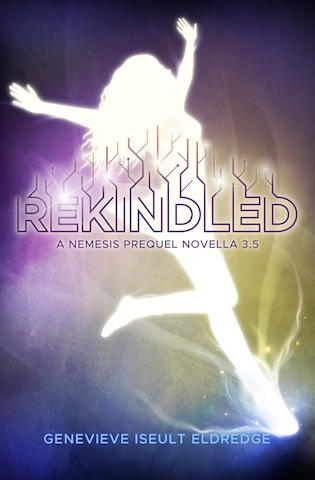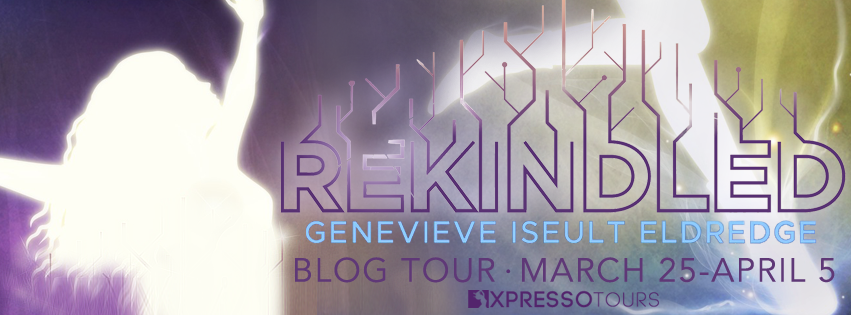
Rekindled
Genevieve Iseult Eldredge
(A Circuit Fae NEMESIS Prequel Novella, #3.5)
Published by: Firefly Hill Press
Publication date: March 26th 2019
Genres: Urban Fantasy, Young Adult
“If you like reading about the fae, other realms and watching two bada** chicks fight then you will love this series! – The Avid Reader
It’s good to be queen. Except when it’s a total disaster.
Syl Skye, newly crowned Queen of Fair Faerie, would be psyched to be the ruler of her Summer realm, except for two things.
First, her girlfriend Rouen Rivoche became Queen of Dark Faerie, the Winter realm. That would be great except the Winter realm’s always been at war with Summer. By tradition, that makes Rouen Syl’s mortal enemy. That said, love can break past old hatred, right? Especially with a new foe about to attack them both.
Ah, no.
Which brings us to Syl’s second problem. Rouen’s under a dark spell and doesn’t remember Syl, their lives, their love. Worse, if Syl doesn’t break the spell by the next new moon, Rouen will forget her forever.
“Fast paced, full of action, never a moment of bore! Strongly recommended!” – Annarella, Goodreads
To defeat their foe, it’ll take two soul-bound queens whose hearts and minds act as one. Trouble is, no one has ever broken the dark spell Rouen suffers from.
Good thing Syl isn’t the type of queen who gives up easily.
Don’t miss Syl and Roue’s adventures in REKINDLED, the new prequel novella to NEMESIS, Book 4 of the Circuit Fae
Don’t miss out!
Perfect for readers of romance, urban fantasy, fairy stories and LGBT.
Goodreads / Amazon / Barnes & Noble / iBooks / Kobo / Google Play
Guest Post from Genevieve Iseult Eldredge
Diversity and Representation: One Reader’s Persepective
It’s no secret that diversity is gaining ground in popular media. Our world is amazingly diverse, and marginalized people are rightfully demanding movies about protagonists like them. As part of the LGBTQ+ community and an own voices author (meaning, my protagonists and I share a marginalized lesbian identity), I can attest that we’re so ready for diverse books.
So! Ready!
We’re hungry for these books and to see ourselves reflected in print, and that’s a good thing, if I remember old-school economics supply-and-demand.
However, there’s a slightly less positive side effect to all this demand. I began noticing it last year when I really dove into reading all the LGBTQ+ YA I could get my hands on. I also started paying attention to reviews on GoodReads and Amazon, and I uncovered a trend.
Those authors who were perceived by readers as having done LGBTQ+ representation “wrong” were vilified in the reviews and, sometimes, even elsewhere on the internet.
Okay, first, I want to say that, yes, it is possible to get representation wrong. You only have to look at past (and some present) LGBTQ+ representation in popular culture to see it’s rooted in homophobia (or transphobia, etc.), and there are some particularly tone-deaf cases out there.
But what about the author who is really trying to get it right and falls a little short? Should we attack them with bad reviews when it was clear that their intention (if not their execution) was right?
And why does representation seem like such a double-edged sword?
As an own voices author, I’ve found myself being overly critical at times, and I started to examine my own thoughts and emotions about the lack of diversity in books and how this was related to my own critical thoughts.
What I came to was this:
Diversity in books and other media is just beginning to gain ground, so there’s a dearth of stories about LGBTQ+ characters. By now, we’ve read Malinda Lo, Sarah Waters, TJ Klune, and the trailblazers before us, and we’re hungry—starving—for more.
Unfortunately, what’s falling from the literary table is crumbs. Some of them are amazing crumbs, but they are crumbs nonetheless, and not enough to satiate us. Oftentimes, too, those crumbs are more coming-out stories. This is not to say that coming-out stories are bad. On the contrary, I think we desperately need coming out stories, but… Those aren’t the only stories the LGBTQ+ community has to tell. We want our cheesy rom-coms, our fun action-adventures, our sci-fis and horror.
And that’s where the frustration comes in and why, when we see an author try to include diverse characters and not do so well, we can be overly critical.
When we don’t see our exact experience reflected on the page, we can’t help but feel disappointed. It makes sense. Everyone in the LGBTQ+ community has been dying to read stories about characters like us. So when we see something, and it doesn’t reflect our personal experience, we feel cheated.
We’re so hungry for these books, and to see ourselves reflected in print that we tend to look at the books out there, to look at the characters, plots, and situations and hold these up as the be-all and end-all of LGBTQ+ characters, plots, and situations everywhere.
I noticed a knee-jerk tendency to view every LGBTQ+ character as somehow representative of ALL LGBTQ+ characters, and that’s not what any sane author intends. What we intend is to tell the story of THESE particular characters in THIS particular situation.
But when “representation” is the expectation the reader brings to the book, they can come away disappointed and feel underrepresented even by representation itself.
The crumbs falling from the table—the crumbs that should keep us from starving—don’t. The result is that it’s natural to want to turn to the keyboard and give a scathing review.
But here’s why that may not be such a great practice:
First, the idea that one must be of a marginalized identity to write about marginalized identity is something I truly believe we need to shatter. Of course, I love all my fellow own voices authors, and I support them, but we need to empower others to write diversity, to educate themselves, and write it well.
Because diversity reflects the real world around us, and that world belongs to everyone.
Second, by attacking well-meaning authors when they don’t get every detail right, by not having conversations about how to write better, stronger, more representation, we’re stabbing ourselves in the foot before the big race.
Because only by supporting diverse books will we signal to the writing community to give us more diverse books.
Which brings me to my point: the whole “stay in your lane” mentality is inherently harmful because it results in us Othering our diverse expressions rather than accepting them.
That’s not to say we can’t thoughtfully critique someone’s work and their expressions of representation. In fact, we absolutely should! And we need to call out homophobia, transphobia, and other prejudiced viewpoints. But it’s by engaging in these conversations that we’ll do the best good—for the industry and for us.
But it must be a conversation not an attack against a well-meaning author/creator.
In checking my own behavior, I’ve decided on a few Rules of Engagement for myself:
- Don’t assume intent. Don’t assume that author is deliberately trying to be offensive and/or tone-deaf and don’t assume that the author is holding up these characters to be the be-all and end-all of LGBTQ+ expression.
- Approach the writing as one person’s (or character’s) experience, just as valid as any other, and if you see something that seems out of whack, have conversations about it—focusing on bettering our experience rather than assuming ill intent and attacking one another.
- Don’t be one of those people who deliberately takes things out of context. I’ve seen reviewers cherry-pick certain lines of dialogue or narrative and use them completely out of context to paint the author in a negative light. Don’t do this. It’s bad karma, and it really reflects the reviewer’s negativity than any failing on the author’s part.
- Go on the journey the author takes you on. Rather than approaching a book with loads of expectations, give the author the benefit of the doubt and see where they take you. Squelch criticisms rooted in thoughts like, “If I had written this…” or “I think it should have happened like this.” Those thoughts just foster negativity and hinder your enjoyment. And that’s one of the main reasons to read.
- Foster a community of positivity. I think some of the bloggers and reviewers have this idea that they should be really tough on books. Of course, if you don’t like a book, or you think there’s a valid criticism, bring it up. And yes, have intelligent debates about what was done well and what wasn’t—and how that author could improve. But leave the meanness behind.
- Support diverse books. Buy them. Review them. Ensure your critiques are well-thought-out and free from attacks on the author. It’s very possible to write a tough critique without resorting to ad hominem attacks.
While not every scenario will fit into the above Rules of Engagement, and no one should feel like they have to be a queer ambassador, only by starting from a place of positivity will we break down the barriers between us, will we foster true acceptance—where LGBTQ+ books are perceived as not just for LGBTQ+ folks but for everyone.

Author Bio:
Raised by witches and dragons in the northern wilds, GIE writes angsty urban fantasy YA romance–where girls who are mortal enemies kick butt, take names, and fall in love against all odds.
She enjoys long hikes in the woods (where better to find the fair folk?), believing in fairies (in fact, she’s clapping right now), dancing with dark elves (always wear your best shoes), being a self-rescuing princess (hello, black belt!), and writing diverse books about teenage girls finding love, romance, and their own inner power.
She might be planning high tea at the Fae Court right now.
GIE is multi-published, and in her role as an editor has helped hundreds of authors make their dream of being published a reality.
The Circuit Fae series
GIVEAWAY!

